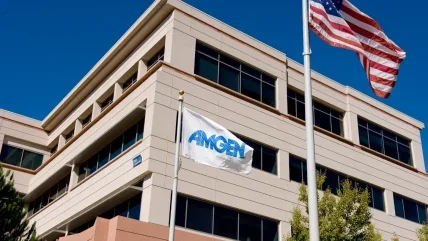
The US Food and Drug Administration (FDA) has approved Amgen’s sotorasib (Lumakras) and panitumumab (Vectibix) for adults with KRAS G12C-mutated metastatic colorectal cancer (mCRC).
This approval applies to patients who have previously received chemotherapy based on fluoropyrimidine, oxaliplatin, and irinotecan. However, the approval is contingent on testing using an FDA-approved test.
In parallel, the health agency has approved Netherlands-based Qiagen’s therascreen KRAS RGQ PCR Kit as a companion diagnostic. This kit helps identify colorectal cancer patients with KRAS G12C mutations who may be eligible for Lumakras and Vectibix.
Lumakras is an oral drug that targets a mutated form of the KRAS gene, found in 3% to 5% of colorectal cancers.
The drug was granted FDA accelerated approval in 2021 for treating KRAS G12C ‑mutated locally advanced or metastatic non-small cell lung cancer (NSCLC). In 2022, Lumakras was approved in Japan for the same indication.
Vectibix is a monoclonal antibody that targets a mutated form of the EGFR gene, known for driving rapid tumour cell growth.
The combination therapy’s efficacy was assessed in the CodeBreaK 300 trial. This review utilised the Real-Time Oncology Review (RTOR) pilot programme and the Assessment Aid.
CodeBreaK 300 was a randomised, open-label study involving patients with KRAS G12C-mutated mCRC who had prior chemotherapy.
KRAS mutations were identified in tumour samples using the QIAGEN therascreen KRAS RGQ PCR kit.
A total of 160 patients were randomised to receive either 960 mg sotorasib plus 6 mg/kg panitumumab, 240 mg sotorasib plus 6 mg/kg panitumumab, or investigator’s choice of standard of care treatments.
The major efficacy endpoint was progression-free survival (PFS), evaluated by a blinded independent central review using RECIST v1.1 criteria.
Additional efficacy outcomes included overall survival (OS), overall response rate (ORR), and duration of response (DOR).
The study was not powered for OS.
Median PFS was 5.6 months for the sotorasib/panitumumab arm, compared to two months for the standard of care (SOC) arm.
The final OS analysis was not statistically significant. ORR was 26% in the sotorasib/panitumumab arm, and 0% in the SOC arm.
Median DOR was 4.4 months in the sotorasib/panitumumab arm.
The final analysis of PFS for patients in the sotorasib 240 mg/panitumumab arm, compared to the SOC arm, was not statistically significant.
Last year, the FDA approved Bristol Myers Squibb’s Krazati for treating colorectal cancer in patients with a KRAS mutation.






